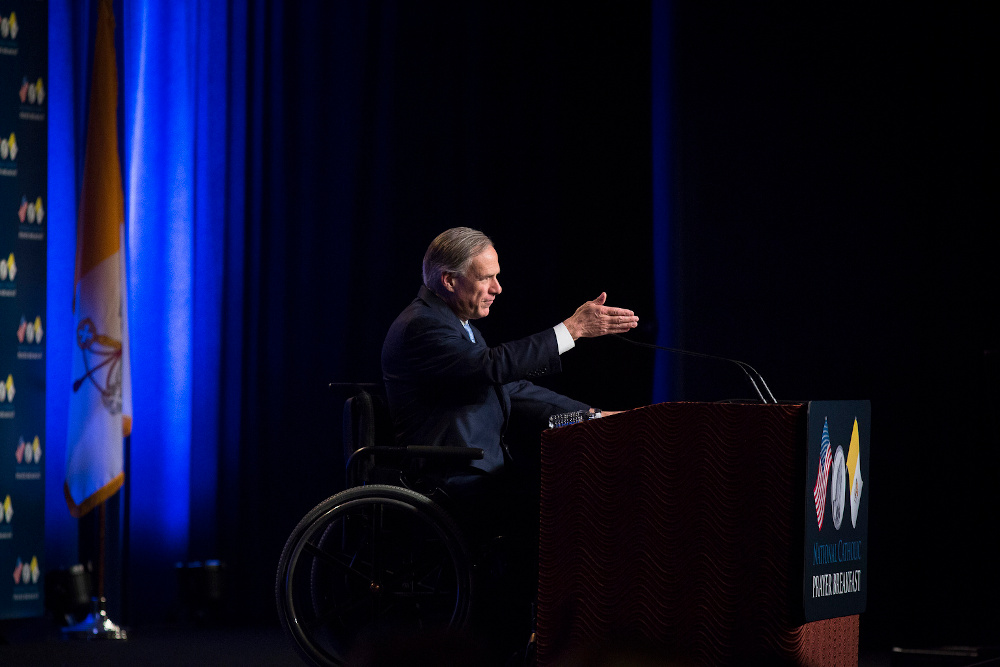
In this 2015 file photo, Texas Gov. Greg Abbott speaks in Washington during the National Catholic Prayer Breakfast. (CNS/Tyler Orsburn)
Texas Catholic leaders were quick to take a stand against a Jan. 10 announcement by Texas Gov. Greg Abbott that the state would no longer resettle refugees.
The governor's decision, announced in a letter to Secretary of State Mike Pompeo, makes Texas the first state to reject refugee resettlement after last year's executive order by President Donald Trump requiring governors to publicly say if they would accept refugees after June 2020.
To date, governors in 42 states have said they will accept more refugees. Governors from five remaining states that accept refugees — Alabama, Georgia, Florida, Mississippi and South Carolina — have yet to respond to the Jan. 21 deadline.
Texas bishops responded individually on Twitter to the governor's decision, urging him to reconsider. In a Jan. 10 statement, the Texas Catholic Conference, the public policy arm of the state's bishops, said the move to "turn away refugees from the great state of Texas" was "deeply discouraging and disheartening."
The conference said it "respects the governor" but said his decision in this case was "simply misguided" because it "denies people who are fleeing persecution, including religious persecution, from being able to bring their gifts and talents to our state and contribute to the general common good of all Texans."
In his letter to Pompeo, Abbott, who is Catholic, emphasized the work Texas has done in welcoming refugees, saying that since fiscal year 2010 "more refugees have been received in Texas than any other state."
"Texas has carried more than its share in assisting the refugee resettlement process and appreciates that other states are available to help with these efforts," the letter said.
Ashley Feasley, director of policy for Migration and Refugee Services of the U.S. Conference of Catholic Bishops, told Catholic News Service that Abbott's decision is a "big deal" because the state has resettled 10% of refugees in the United States in the past 10 years.
She said the move does not mean that refugees can't come to the state, but they cannot be resettled there.
That decision, she said is a problematic one. For starters, about 80% of the refugee cases are described as "follow to join," meaning these refugees, whose cases have been vetted, are looking to join a family member or friend in the community. Allowing them to resettle with people they already know is a request that resettlement agencies try to honor, she said, because it helps with the adjustment.
She also noted that Abbott's decision, and others to come by the remaining state governors who have not weighed in, could be impacted by a federal judge's ruling on Trump's order expected Jan. 17. The judge will be ruling on the lawsuit brought on by three refugee resettlement organizations that sought a preliminary injunction to block the executive order.
Texas bishops who responded to Abbott's Jan. 10 decision on Twitter were: Archbishop Gustavo Garcia-Siller of San Antonio and Bishops Michael F. Olson of Fort Worth, Edward J. Burns of Dallas and Daniel E. Flores of Brownsville.
In a Jan. 10 statement, Burns said he was disappointed in the governor's decision and hoped he would reconsider it.
He said the Diocese of Dallas is "grateful for the outstanding, compassionate work done by Catholic Charities Dallas in partnership with the United States government to resettle men, women and children who are desperate to find safety and freedom. All of the refugees served in this way have been thoroughly screened and approved for resettlement by the Department of Homeland Security Office of Refugee and Resettlement."
Olson, also in Jan. 10 statement, said he "strongly and respectfully" disagreed with the governor's decision.
If the governor stands by this move, he said, "current refugee support services will have to replace the lost federal refugee funds with local dollars currently dedicated to social supports services such as work programs and out of poverty programs."
The bishop said 96% of refugees being resettled in Fort Worth reach self-sufficiency and employment within six months of arrival.
"Catholic Charities Fort Worth and the Catholic Charities offices across our state have compassionately worked in partnership with the federal government, the state, and local officials and communities to help refugees make Texas their home, finding employment, learning English and integrating into our great state of Texas that they now call home, " he added.
Advertisement





